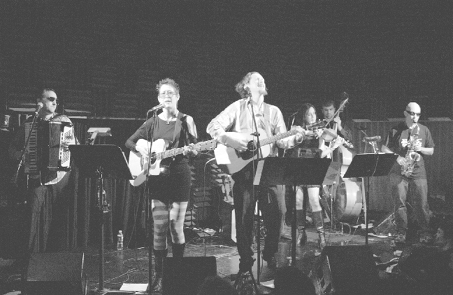By Lawrence Lerner
In a Downtown music scene known for amped-up bands playing within clearly defined genres, the all-acoustic Uncle Moon stands out for its willingness to obliterate such distinctions and send the drummer packing. Formed in March 2000, the eclectic-five-piece art band featuring acoustic guitar, accordion, violin, saxophone and bass blends a variety of styles—including jazz, country, punk, bluegrass, klezmer, cajun, cabaret and poetry.
The result: haunting, theatrical originals, along with inventive reinterpretations of songs by such disparate artists as Thelonious Monk, Butthole Surfers, Liz Phair and The Velvet Underground, whose “Velvet Underground and Nico” album Uncle Moon has performed on a number of occasions, including BAM Café’s Warhol film restrospective in Oct. 2003.
On Monday night, Uncle Moon dusted off the album once again and, joined by special guest Michelle Shocked, played it in its entirety for dissident playwright-turned-Czech President Vaclav Havel, as part of a farewell party at Joe’s Pub for Mr. Havel and the Untitled Theater Co. #61’s Havel Festival.
I caught up with Uncle Moon singer/guitarist Trey Kay and arranger/accordionist Carl Rhiel last week to discuss their music, the Velvet Underground and Havel.
Uncle Moon has been described as “Kurt Weill at the Grand Ole Opry,” among other things. What’s the source of your genre-hopping?
Trey Kay: I grew up in West Virginia on country, bluegrass and rock—and on Tom Waits. Carl is classically trained. Our sax player is into experimental jazz. Our bassist is into hardcore and alt-rock and is a musical encyclopedia in terms of what’s out there. So, we listen widely, do a lot of genre-diving and cover a lot of territory. The nice thing about it is, we run the band democratically and all get along. So, a lot of those genres show up in the material we do.
And you do this with an all-acoustic line-up.
Kay: Sure, why not? Rock ’n’ roll has gotten to a place where you’ve got to have a guitar, drums and so forth. It’s turned into a compulsory thing. But if I sit down and am turned on by Django [Rhinehart] or Thelonious [Monk] or Cole Porter, then I don’t want to have to squash that impulse because I can’t figure out a way to bring in the Marshall stacks and guitar lead.
Carl Rhiel: Exactly. And if I were playing in a band with electric guitar and drums, I’d never cover the [Velvet Underground’s] Nico album. It’s been done.
It’s much more interesting for me to figure out how to transplant droning or shrieking electric guitars to acoustic instruments. If you’re not progressing the music when covering it, then what’s the point?
How did the band end up playing the Velvet Underground’s music?
Kay: A few years back, we decided to take on a cover project, and we went through a top-100 album list and realized that the “Banana” album best matched our sensibilities. I don’t think anyone of us came to a rehearsal and said, ‘We want to follow in the footsteps of the Velvet Underground,’ but I do think that we are unwittingly from the tree of the VU, an arty band that likes beautiful melodies and dissonant noise, and likes to get in people’s face with what we’re doing. That’s what the ’60s art-rock movement was all about, and if someone said we’re derivative of that, I’d own it proudly.
Is there anything daunting about taking on one of the most famous albums of all time?
Kay: I was really daunted by “Heroin,” but I really like performing that song because I don’t do heroin, and I don’t want to do heroin, and I won’t say doing the song makes me feel like I’m doing heroin, but it gives me an actor’s way into doing and understanding the material, which I love.
You haven’t played the “Banana” album live, in its entirety, for three years, and here you are, feting Vaclav Havel.
Rhiel: I’m still kind of awestruck that we’re performing for him, and being on-stage with Michelle Shocked should also be amazing. Coming into this, I knew what an educated layperson knew about the Velvet Revolution. I had also seen a couple of Havel’s plays and knew enough to think of him as a modern-day hero. But to get to perform for him is just fantastic.
Kay: Yeah, I’m still pinching myself about this gig. But I think we do this music very well. We do it justice. And we’re a good band for the occasion.
So, then Michelle Shocked enters the picture.
Kay: We approached a few different women—and one drag queen, Lusty Chiffon—to sing the Nico part with us for the Joe’s Pub show. Michelle got back to us by e-mail right away, saying she was into it. And she has this painter/artist boyfriend, the type of guy who would get really stoked to dress her up as Nico, so that should be fun. And as an artist, she’s not afraid to step out of her comfort zone, which I respect a lot. I don’t know what she’ll bring to the Nico music, but I’m excited to find out.
Havel—dissident playwright-turned-president—often speaks of the inspiration that bands like the VU and Frank Zappa had on him and on the Velvet Revolution. What’s your take on this?
Kay: A friend once said to me, ‘Sometimes you can get to a different truth if you refract it,’ and that’s what the VU did, to where it takes us to a deeper level of the truth.
Rhiel: Definitely. And that’s why it was integral to the Velvet Revolution. If [’70s Czech underground band] Plastic People of the Universe had listened to the Beatles, would we be having this conversation now? I’m not sure. There’s something particular about the music of VU and Zappa—a particular spirit and truth and no-holds-barred irreverence—that was probably important to sparking a revolution in a totalitarian state.
To learn about Uncle Moon’s upcoming shows, visit unclemoon.com.

































